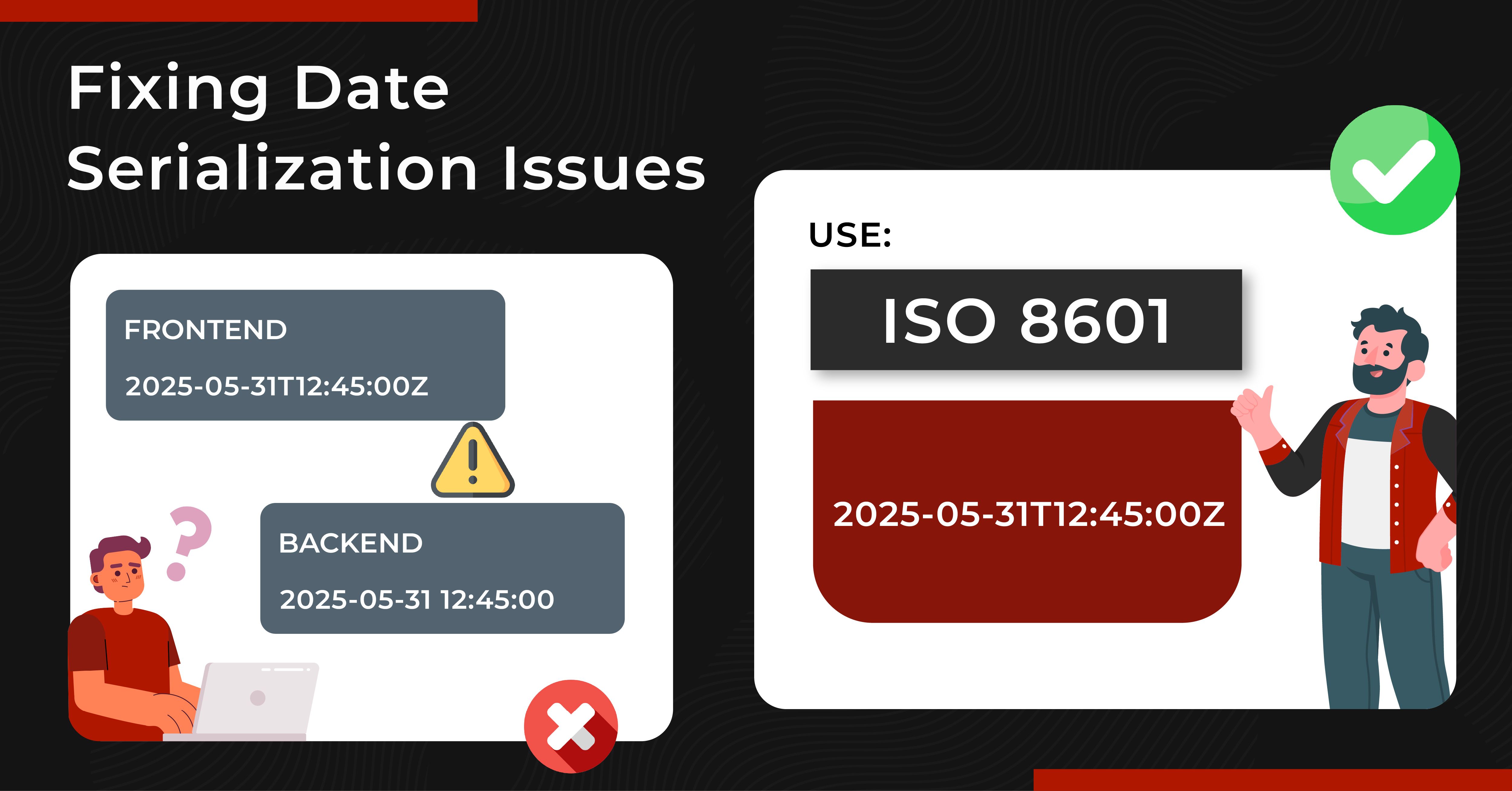Navigating the intricate world of full-stack development often brings unique challenges, and among the most tenacious are date and time synchronization issues. If you've ever grappled with inconsistent date-time behavior across your backend and frontend, particularly when bridging the gap between Java (Micronaut) and JavaScript, you're not alone.
This post delves into a real-world scenario involving a Micronaut backend and a JavaScript frontend and illustrates how standardizing on ISO 8601 emerged as the definitive solution. We'll explore the problem, the solution, the necessary code configurations, and practical tips applicable to your own projects.
The Problem: Inconsistent Date Formats Across Platforms
A common pitfall in full-stack development stems from the differing default date and time handling mechanisms between Java (specifically Micronaut with Jackson) and JavaScript.
- Java (via Jackson) typically employs formats like yyyy-MM-dd'T'HH:mm:ss
- JavaScript, on the other hand, expects ISO 8601 strings such as 2025-05-31T12:45:00Z
This fundamental mismatch often leads to perplexing issues, especially when dealing with time zones. Dates and times might appear correct within their respective environments, only to become unreliable and skewed when transmitted between the two, leading to subtle yet significant bugs.
The Solution: Universal Adoption of ISO 8601

The most effective strategy to overcome these discrepancies is to standardize all date and time values to ISO 8601. This robust standard is:
- Machine-readable: Ensures seamless parsing by systems.
- Timezone-aware: Incorporates timezone information directly, preventing ambiguity.
- Widely supported: Enjoying broad support across both Java and JavaScript ecosystems.
Let's break down the implementation.
Step 1: Configuring the Micronaut Backend
The initial step involves adjusting Jackson's serialization settings within Micronaut to output ISO 8601 strings rather than numerical timestamps.
Add the following configuration to your application.yml file:
YAML
jackson:
serialization:
write-dates-as-timestamps: false
This configuration ensures that modern Java 8+ date and time types, including LocalDate, LocalDateTime, Instant, and ZonedDateTime, are serialized into the ISO 8601 string format.
Handling Edge Cases
Even with the initial configuration, two specific edge cases can arise:
- LocalDateTime parsing failures: When JavaScript sends a UTC datetime without a timezone offset (e.g., +00:00), Micronaut might expect this offset, leading to parsing errors.
- java.sql.Timestamp serialization: Dates represented as java.sql.Timestamp might not be serialized correctly when transmitted to the frontend.
The Fix: Custom ObjectMapper Configuration
To address these edge cases, a custom Jackson ObjectMapper configuration is essential. This can be done by registering a custom module or using a ObjectMapperCustomizer bean that:
- Correctly deserializes LocalDateTime values, even when they lack an explicit timezone offset.
- Ensures proper serialization of java.sql.Timestamp objects.
Custom ObjectMapper Configuration (ObjectMapperConfiguration.java)
Java
package io.yourapp.package.services.custom_serialize;
import com.fasterxml.jackson.databind.ObjectMapper;
import io.micronaut.context.event.BeanCreatedEvent;
import io.micronaut.context.event.BeanCreatedEventListener;
import jakarta.inject.Singleton;
@Singleton
public class ObjectMapperConfiguration implements BeanCreatedEventListener<ObjectMapper> {
private final LocalDateTimeDeserializerModule customDeserializerModule;
public ObjectMapperConfiguration(LocalDateTimeDeserializerModule customDeserializerModule) {
this.customDeserializerModule = customDeserializerModule;
}
@Override
public ObjectMapper onCreated(BeanCreatedEvent<ObjectMapper> event) {
ObjectMapper objectMapper = event.getBean();
objectMapper.registerModule(customDeserializerModule);
return objectMapper;
}
}
Custom Serialization and Deserialization Module (LocalDateTimeDeserializerModule.java)
Java
package io.yourapp.package.services.custom_serialize;
import com.fasterxml.jackson.core.JsonGenerator;
import com.fasterxml.jackson.core.JsonParser;
import com.fasterxml.jackson.databind.DeserializationContext;
import com.fasterxml.jackson.databind.JsonDeserializer;
import com.fasterxml.jackson.databind.SerializerProvider;
import com.fasterxml.jackson.databind.module.SimpleModule;
import com.fasterxml.jackson.databind.ser.std.StdSerializer;
import jakarta.inject.Singleton;
import java.io.IOException;
import java.sql.Timestamp;
import java.time.Instant;
import java.time.LocalDateTime;
import java.time.OffsetDateTime;
import java.time.ZoneOffset;
import java.time.format.DateTimeFormatter;
import java.time.format.DateTimeParseException;
@Singleton
public class LocalDateTimeDeserializerModule extends SimpleModule {
public LocalDateTimeDeserializerModule() {
super("UtcLocalDateTimeDeserializerModule");
addDeserializer(LocalDateTime.class, new UtcLocalDateTimeDeserializer());
addSerializer(Timestamp.class, new TimestampSerializer());
}
public static class UtcLocalDateTimeDeserializer extends JsonDeserializer<LocalDateTime> {
@Override
public LocalDateTime deserialize(JsonParser p, DeserializationContext ctxt) throws IOException {
String dateString = p.getText();
Instant instant;
try {
OffsetDateTime odt = OffsetDateTime.parse(dateString);
instant = odt.toInstant();
} catch (DateTimeParseException e) {
try {
LocalDateTime localDateTime = LocalDateTime.parse(dateString,
DateTimeFormatter.ISO_LOCAL_DATE_TIME);
instant = localDateTime.toInstant(ZoneOffset.UTC);
} catch (DateTimeParseException ex) {
System.err.println(
"Failed to parse date string '" + dateString + "' as either OffsetDateTime or LocalDateTime.");
throw new IOException("Failed to deserialize LocalDateTime: " + dateString, ex);
}
}
return LocalDateTime.ofInstant(instant, ZoneOffset.UTC);
}
}
public static class TimestampSerializer extends StdSerializer<Timestamp> {
private static final DateTimeFormatter FORMATTER = DateTimeFormatter.ISO_INSTANT;
public TimestampSerializer() {
super(Timestamp.class);
}
@Override
public void serialize(Timestamp value, JsonGenerator gen, SerializerProvider provider) throws IOException {
gen.writeString(value.toInstant().toString());
}
}
}
Step 2: Handling Dates in JavaScript
Once the Micronaut backend is configured to send ISO 8601 strings, JavaScript's native Date object can effortlessly parse them without requiring any custom parsing logic.
JavaScript
const date = new Date(iso8601StringFromBackend);
It's that straightforward—no manual parsing or intricate formatting is necessary.
Bonus Tip: Embrace UTC Everywhere
To effectively mitigate the majority of timezone-related bugs, adopt a strict policy of using Coordinated Universal Time (UTC) for all datetime storage and transmission, across both your frontend and backend. While ISO 8601 is flexible enough to accommodate any timezone, standardizing on UTC guarantees consistent behavior across diverse systems and for users located in different geographical regions.
Quick Recap: Actionable Steps
1. Configure application.yml
Disable timestamp serialization by adding the following setting:
jackson:
serialization:
write-dates-as-timestamps: false
2. Customize the ObjectMapper
Implement and register a custom Jackson configuration by:
• Creating a ObjectMapperCustomizer bean.
• Registering a custom deserializer for LocalDateTime to correctly handle values without a timezone offset.
• Ensuring proper serialization for java.sql.Timestamp objects.
3. Leverage Provided Implementations
Integrate the ObjectMapperConfiguration and LocalDateTimeDeserializerModule (as demonstrated above) into your project to streamline setup.
4. Simplify Date Parsing in JavaScript
Directly parse ISO 8601 strings received from the backend using JavaScript's native Date object:
const date = new Date(iso8601StringFromBackend);
Conclusion
For teams working with Micronaut and JavaScript, ISO 8601 combined with UTC standardization offers a reliable way to avoid date-time discrepancies. The approach prevents subtle, hard-to-trace timezone bugs, ensures consistency across APIs, and keeps client-side parsing straightforward. Following these proven conventions positions your application for clean integrations and long-term scalability.

